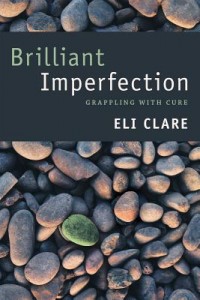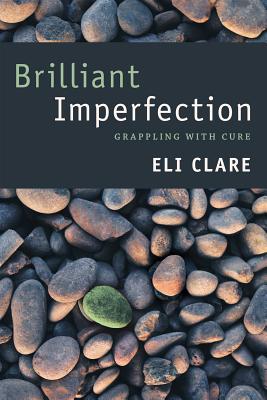 Brilliant Imperfection: Grappling with Cure
Brilliant Imperfection: Grappling with Cure
by Eli Clare
Duke University Press. 240 pages, $22.95
ELI CLARE’S BOOK of essays, Brilliant Imperfection: Grappling with Cure, is a clarion call for changing the medicalized disability narrative, that of “defective brokenness,” that often prevails in U.S. healthcare. As a transgender man living with cerebral palsy, Clare’s insights challenge existing notions of what is “normal and natural,” affirming that “there’s nothing wrong with our disabled body-minds.”
Rather than longing for a cure, Clare embraces his trembling hands, slurred speech, and stumbling balance. He reminds readers that we “devalue our present-day selves” by ignoring the “brilliant imperfection of our lives.” Historical research, memoir, and poetry are interwoven throughout the book, as Clare debunks the “inspiration porn” of able-bodied folks who sanctify and thereby objectify people with disabilities. There are many parallels with racial, women’s, and LGBT civil rights struggles, and Clare draws from these in addressing the situation for those with disabilities in the context of the medical-industrial complex, especially as they intersect with race, sexuality, gender, and economic marginalization. Environmental polemics and examples from ecosystem restoration further inform his lucid analysis. In 1966, at two-and-a-half years old, Clare was diagnosed as mentally retarded. He and his parents visited the Fairview Hospital in Oregon that housed 3,000 people, many of whom had been institutionalized their entire lives (and often sterilized from state-sponsored eugenics programs). Luckily, he was not committed. Ten years later, his parents were told that he had cerebral palsy. A battery of orthopedists, physical therapists, psychologists, audiologists, and speech pathologists were then unleashed to make him “better.” As an adult, he was at risk for schizophrenia and suicide because of past trauma from childhood sexual and physical abuse by his father. His community of support helped him to cope—and to avoid being medicated with psychotropic drugs. The author staunchly refuses to be constrained by any diagnostic conditions. Instead, he reclaims them as unique assets of his individuality. Other advocates reinforce this affirmation of difference. Clare also writes cogently about the contradictions he faced between his holistic body-mind perspective and his desire for gender transition. After a lifetime of rejecting medical labels, he found himself adhering to one, namely “Gender Identity Disorder,” which was needed to allow his chest reconstruction surgery to go forward. Questions are posited throughout this elegant treatise that seeks to reframe disability. Most poignant and pertinent is this one: “What do we need to make peace with our visceral selves today, to let go of the fantasies, even if we hope beyond hope that our flesh and bones, organs and neurons might be different someday down the line?” Brilliant Imperfection provides empowering answers and guidance—contributing significantly to the evolving discourse on gender, queer, and disability studies. _______________________________________________ John R. Killacky co-edited and contributed to the anthology, Queer Crips: Disabled Gay Men and their Stories.





